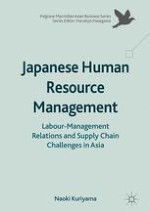2017 | OriginalPaper | Chapter
5. Resilience of Japanese Automobile Investment in Thailand during the 1997 Asian Financial Crisis
Author : Naoki Kuriyama
Published in: Japanese Human Resource Management
Publisher: Springer International Publishing
Activate our intelligent search to find suitable subject content or patents.
Select sections of text to find matching patents with Artificial Intelligence. powered by
Select sections of text to find additional relevant content using AI-assisted search. powered by
